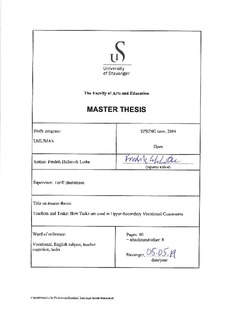| dc.contributor.advisor | Hestetræet, Torill | |
| dc.contributor.author | Lothe, Fredrik | |
| dc.date.accessioned | 2019-07-01T12:10:04Z | |
| dc.date.available | 2019-07-01T12:10:04Z | |
| dc.date.issued | 2019-05 | |
| dc.identifier.uri | http://hdl.handle.net/11250/2603047 | |
| dc.description | Master's thesis in Literacy Studies | nb_NO |
| dc.description.abstract | This thesis has aimed to investigate what teachers believe about the use of tasks in the English subject in vocational classrooms and how the teachers’ beliefs relate to their actual practice. The research questions were the following: what are the teachers’ beliefs about the use of tasks in vocational classrooms and how do their beliefs relate to their practice, what tasks do the teachers use and how do they use them, and what contextual factors can affect and influence the teachers’ beliefs and practices today. The qualitative data material consists of six interviews and six observations. The pre-observation interviews followed a semi-structured interview guide. Three English subject teachers in vocational classes partook in this study and they were chosen through purposive sampling. The study has been informed by theory which emphasizes the use of tasks in the language classroom, such as Communicative Language Teaching, Task-Based Language Teaching and Vocationally Oriented Language Learning. The tasks themselves could be grouped under these categories, such as communicative tasks, “real-world” tasks, or vocational tasks.
The use of tasks in English language teaching seemed to be a common practice. The results of the study showed that the observed teachers used different kinds of tasks. Examples of tasks were: information-transfer tasks, role-plays, write summaries, fill-in-the-gap tasks, but also reading aloud in class and plenary discussions. A reason for this could be that the teachers assessed their classes’ abilities and needs and found suitable tasks that improved on their students’ competences. Furthermore, the teachers put fairly similar amounts of emphasis on communication and interaction. Observations also found that the teachers wanted their students to take responsibility of their own teaching and the use of tasks encourages this.
The results viewed in light of the theory showed that there was a strong relation between the teachers’ beliefs and practices. However, there were some findings of interest for both teacher educators and researchers of teacher cognition. The tensions that were found indicated that the teachers’ beliefs could be influenced or affected by the contextual factors. An example of this was in one of the vocational classes were the students’ competence and motivation were on a generally low level. The teacher there experienced challenges in regard to teaching the way he wanted to (his beliefs and cognitions) and how the practical reality of the classroom allowed him to teach (his practice).
Even so, the teachers were found to be generally free in how they used tasks and what activities they could use in their respective classes. All of the teachers believed that “vocationalisation” of the common core subjects had been an improvement and revitalized more of the vocational students’ interest in those subjects, which they mentioned few students were initially inclined towards. A finding of interest was that one of the teachers mentioned that her students sometimes complained that there was too much vocational English and they wanted more general content. Further research should then focus on finding a balance between vocational and non-vocational tasks and content. | nb_NO |
| dc.language.iso | eng | nb_NO |
| dc.publisher | University of Stavanger, Norway | nb_NO |
| dc.relation.ispartofseries | Masteroppgave/UIS-HF-IKS/2019; | |
| dc.rights | Navngivelse 4.0 Internasjonal | * |
| dc.rights.uri | http://creativecommons.org/licenses/by/4.0/deed.no | * |
| dc.subject | lesevitenskap | nb_NO |
| dc.subject | literacy studies | nb_NO |
| dc.subject | vocational | nb_NO |
| dc.subject | english subject | nb_NO |
| dc.subject | teacher cognition | nb_NO |
| dc.subject | tasks | nb_NO |
| dc.title | Teachers and Tasks: How Tasks are used in Upper-Secondary Vocational Classrooms | nb_NO |
| dc.type | Master thesis | nb_NO |
| dc.subject.nsi | VDP::Humanities: 000::Literary disciplines: 040::English literature: 043 | nb_NO |
| dc.source.pagenumber | 80 | nb_NO |

